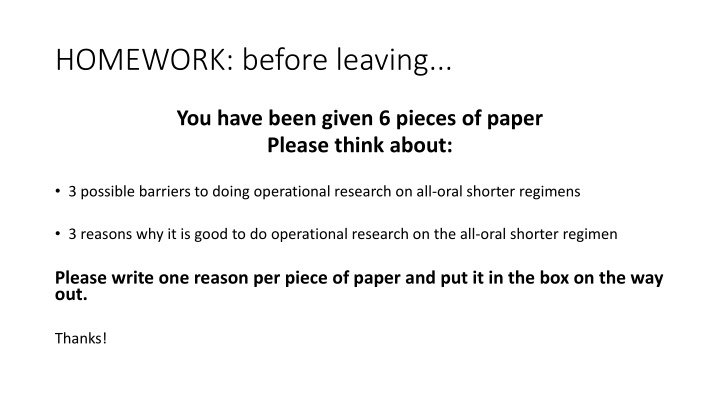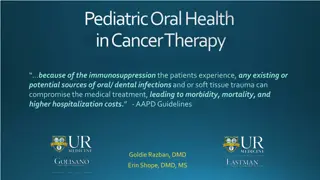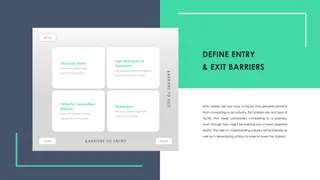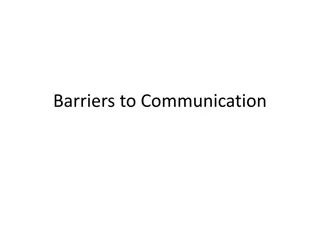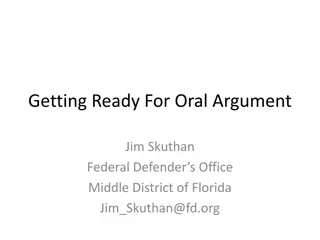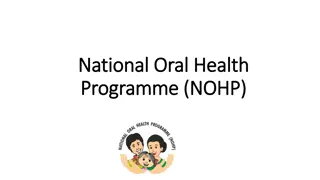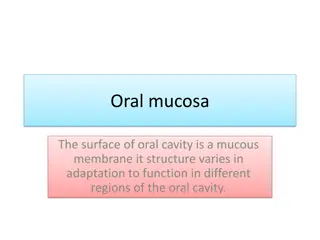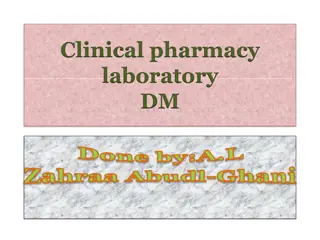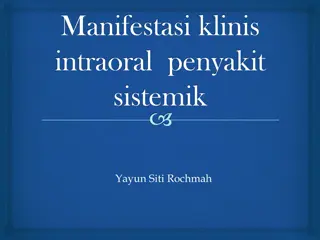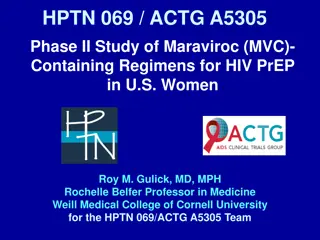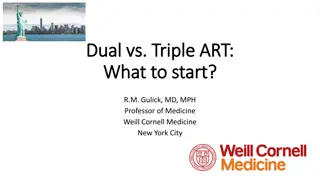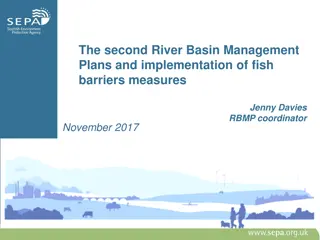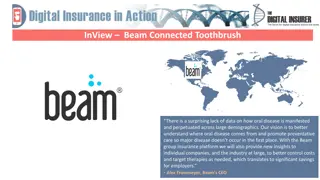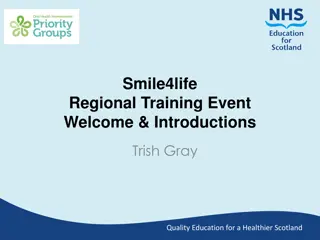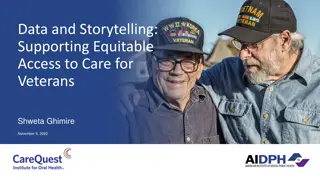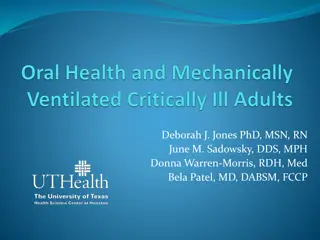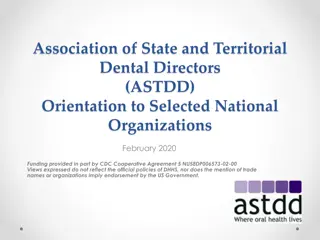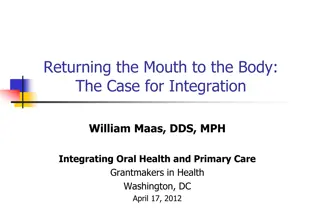Operational Research on All-Oral Shorter Regimens: Barriers and Benefits
Operational research on all-oral shorter regimens presents challenges such as funding limitations, logistical complexities, and resistance from traditional practices. However, conducting such research is crucial for optimizing treatment outcomes, enhancing patient compliance, and addressing emerging resistance patterns. By exploring the barriers and benefits, stakeholders can make informed decisions to improve tuberculosis management strategies.
Uploaded on Sep 07, 2024 | 3 Views
Download Presentation

Please find below an Image/Link to download the presentation.
The content on the website is provided AS IS for your information and personal use only. It may not be sold, licensed, or shared on other websites without obtaining consent from the author.If you encounter any issues during the download, it is possible that the publisher has removed the file from their server.
You are allowed to download the files provided on this website for personal or commercial use, subject to the condition that they are used lawfully. All files are the property of their respective owners.
The content on the website is provided AS IS for your information and personal use only. It may not be sold, licensed, or shared on other websites without obtaining consent from the author.
E N D
Presentation Transcript
HOMEWORK: before leaving... You have been given 6 pieces of paper Please think about: 3 possible barriers to doing operational research on all-oral shorter regimens 3 reasons why it is good to do operational research on the all-oral shorter regimen Please write one reason per piece of paper and put it in the box on the way out. Thanks!
Breakout Session 1: Choosing an all oral STR regimen While some programs are only beginning to consider all-oral short-course regimens, others have established the regimen(s) they would like to use. Choosing the primary regimen to use in your setting is one of the main steps in preparing an operational research protocol. In this session, we would like you to focus on defining the primary regimen you would like to use under operational research and developing the rationale for choosing the regimen you do
Breakout session 1: Questions for Consideration How does it fit into the overall MDRTB management strategy in your country (pilot, country wide)? What will be the primary/main short-course regimen you will use? How did you decide upon this regimen? Are there some situations in which you think this regimen may need to be adjusted (i.e. patient populations, resistance patterns, etc.)? Write on the white board the regimen you will use and the justification for your choice
Breakout session 2 Elements of a protocol Identify the main elements of the protocol where you need to make some decisions and identify what you need to make the decisions: 1. Eligibility criteria 2. Primary and secondary objectives / Outcome definitions 3. Duration of follow-up after treatment / When to assess recurrence rates
Breakout session 2 Part I List the patients eligibility criteria to start an all oral shorter regimen in your country or context Would you include children, pregnant women? Give the reasons for and against Who would be excluded?
Breakout session 2 Part II List the primary and secondary objectives (max 4) List and define the indicators to measure these objectives What is the definition of treatment failure?
Breakout session 2 Part III How would you assess recurrences? What would be the follow-up duration post-treatment What would be the frequency of visits Which examinations and tests that would be done Who would do the follow-up
Breakout session 3 Adapting data collection tools Objective is that think about how you will collect the data you will need: Remember what your objectives are and think about indicators you have already identified yesterday Identify which data you need to collect Choose amongst the forms that exist something that might suit you (existing NTP forms, endTB, destroy, other) Highlight the data you will need to collect, data you don t need and the data you need to add
Breakout session 3 Things to consider on data collection tool What are the local data collection tools you have? Could you these adapt local forms and tools? If you adapt local forms, can you develop some clear instructions about what information to collect and how to collect it? Are you collecting information you dont need because it will not be analysed? Think about who will be collecting this data and how you can make it as easy and stream lined as possible Who will enter and analyse the data? Is the information clear for them? Are you collecting the same information in 2 differents places that could lead to confusion?
Day 3 2:30-3:30 Breakout session 4 Data flow and data management
View and interact with the demonstration site of TB-EMR on your own time https://qa-tbemr.ehealthunit.org/bahmni/home Username: superman Password: Admin123
Objective of the session To think and list the different components of your data management plan 1. Data flow 2. Security aspects 3. Data management
Breakout session 4 Part I (15min) Data flow Draw on a paper what would the data flow in your context/sites/countries: Who will fill the forms? Trainings for filling forms and data entry? Where the data will be entered into the data collection system? Centralized or decentralized data entry? Forms transport and transport back? Who will enter the data? How the data will be shared and with who? Archive?
Breakout session 4 Part II (15min) Security Security Where the forms will be stored? What are the infrastructure in place or needed to ensure security of servers or computers where the database will be installed? Encryption of the data? Define the user rights of the data collection system How to secure data sharing? Confidentiality/privacy How to ensure confidentiality of the data to protect patients' privacy
Breakout session 4 Part III (15min) Data management Organise your data management and data analysis How will you organize the cleaning of the data? Who? internal resources, collaboration with external institutions? What would be the frequency of data cleaning? List 5 important queries that could be part of your data cleaning process How would you organize the cleaning process between clinical and data team? How will you organize the analysis of the data? Who?: internal resources, collaboration with external institutions? Who will draft the analysis plan? Interim analysis? Frequency? Knowledge of statistical package?
